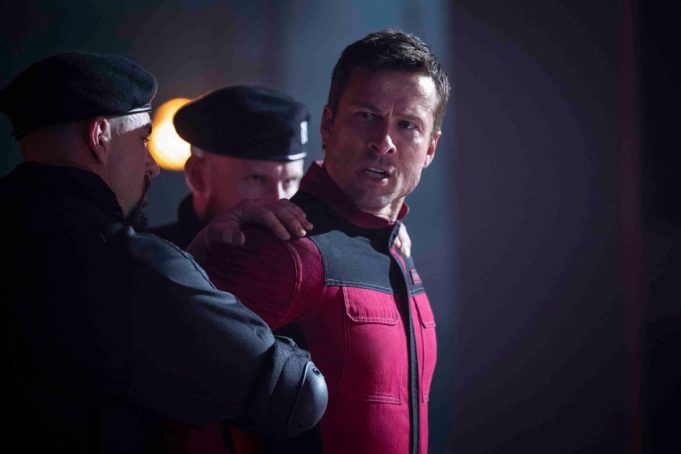Would it be sacrilegious if I said that the new version of The Running Man is a better movie than One Battle After Another? Both films are structured as thrillers with a “fight the power” message for today’s would-be fascist America, and if Edgar Wright’s adaptation of Stephen King’s novel isn’t as thought through as the Paul Thomas Anderson film, it might just be even more entertaining.
If you’re not familiar with the book or the pretty bad 1987 Hollywood movie of it, the story takes place in a dystopian future America where one megacorporation owns the government, the police, and all media outlets. In this environment, Ben Richards (Glen Powell) is a working man who’s blacklisted for being too free with his ideas. With his 2-year-old daughter gravely ill, he reluctantly agrees when the head of the network (Josh Brolin) advises him to compete on The Running Man, a hit game show where three contestants per month agree to be hunted to the death by ordinary citizens, police, and the show’s own private soldiers called “Hunters” in exchange for a huge cash prize. No one has ever come close to winning, but Ben’s family is being paid a mint for every day that he stays alive, as well as every cop he kills.
The film version of The Long Walk ended with the hero’s quest to change the system being subsumed by personal revenge, and so does the book version of this movie. (It ends with Ben carrying out a 9/11-style suicide bombing by flying his getaway plane into the TV studio.) Thankfully, Wright and co-writer Michael Bacall — who collaborated with Wright on Scott Pilgrim vs. the World and Baby Driver — devise a more upbeat ending. Their taste for mischief and cleverness acts as a leavening agent here, as in a great sequence when Ben emerges from a communal bathroom at a fleabag motel in Boston and spots the Hunters gathered outside the door of his room. He has to get back in the room for his clothes, because he won’t get much farther wearing only a bath towel.
This film falls into a familiar trap, as it criticizes a dictatorship for offering up violence as entertainment for the masses, while doing the same thing at the same time. For all their smarts, I’m not sure Wright and Bacall manage to square the bloody circle. Their ingenious touches include Ben trying to deliver an anti-government message to the game show’s audience, only to find it replaced by a deepfake video that makes him look like a homicidal maniac.
Similarly, when Ben carjacks and kidnaps a passing Realtor named Amelia (Emilia Jones), she thinks he’s the boogeyman from the TV until she sees deepfakes that put words in her mouth. Maybe the crux of the problem is the character of a revolutionary (Michael Cera) who helps Ben and then calls the cops on himself so that he can lure them into his booby-trapped house in Derry, Maine and kill a whole SWAT team with a water gun. The movie wants the same creative bloodshed as he and the TV audience for The Running Man does, and neither Ben nor the filmmakers figure out how to make the uncomfortable parallel.
Powell undoubtedly got this role off the strength of his chameleon-like turn in Richard Linklater’s Hit Man, as here he blends into crowds by disguising himself as a mustachioed businessman and a blind Irish priest. He cannily plays Ben as a guy whose initial bird-flipping attitude turns into something more nuanced as the people he meets on the run end up radicalizing him, intentionally or not. Those people include Cera as a guy having the time of his life amid the carnage, Colman Domingo as The Running Man’s dancerly host, and the ubiquitous Katy O’Brian as a fellow contestant who treats the game show as a suicide mission and parties it up before the end.
She inadvertently demonstrates how little regard the regime has for its own when she leads the cops on a chase through a casino, and they fire their guns at her with zero regard for the bystanders who are caught in the crossfire (several of whom die). When Ben and Amelia fall into the hands of a backwoods militia, the Hunters summarily shoot the rednecks to prevent them from taking credit for the kill. The Hunters then are sold out by the network head, who tries to co-opt Ben by promising him their jobs and a TV show of his own if he can murder them.
This is balanced by all kinds of visual creativity on Wright’s part, like shots filmed from the POV of the spherical drones tracking Ben, and a car chase filmed from inside the trunk, where Ben is hiding and can’t see what’s happening. A fight on an airplane with one of the soldiers results in Ben being pushed back into a lavatory, where we can still see his face reflected in the mirror as he keeps struggling.
The shiny computer graphics on the game show contrast and the Kardashian-like reality show that Ben sometimes tunes into contrast sharply with the low-budget videos and 1990s-style zines that the revolutionaries make for themselves. I don’t know how the filmmakers snagged real-life corporate sponsors for this futuristic dystopia, but the Running Man host appears in a commercial for Liquid Death drinking water, and it is funny. If the movie looks like Tron: Ares, it’s backstopped by its humor, story, and characters, all of which that previous film had none of. Despite its intellectual shortcomings, it’s a great time from a filmmaker who deserves a bigger audience.
The Running Man
Starring Glen Powell and Josh Brolin. Directed by Edgar Wright. Written by Edgar Wright and Michael Bacall, based on Stephen King’s novel. Rated R.












